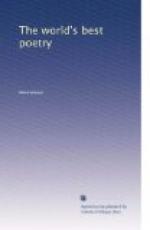But the wind without was eager and sharp;
Of Sir Launfal’s gray hair it makes
a harp,
And rattles and wrings
The icy strings,
Singing in dreary monotone
A Christmas carol of its own,
Whose burden still, as he might guess,
Was “Shelterless, shelterless, shelterless!”
The voice of the seneschal flared like
a torch
As he shouted the wanderer away from the
porch,
And he sat in the gateway and saw all
night
The great hall fire, so cheery
and bold,
Through the window slits of
the castle old,
Build out its piers of ruddy
light
Against the drift of the cold.
PART SECOND.
There was never a leaf on bush or tree,
The bare boughs rattled shudderingly;
The river was dumb and could not speak,
For the weaver Winter its
shroud had spun;
A single crow on the tree-top bleak
From his shining feathers
shed off the cold sun;
Again it was morning, but shrunk and cold,
As if her veins were sapless and old,
And she rose up decrepitly
For a last dim look at earth and sea.
Sir Launfal turned from his own hard gale,
For another heir in his earldom sate:
An old, bent man, worn out and frail,
He came back from seeking the Holy Grail.
Little he recked of his earldom’s
loss,
No more on his surcoat was blazoned the
cross;
But deep in his soul the sigh he wore,
The badge of the suffering and the poor.
Sir Launfal’s raiment thin and spare
Was idle mail ’gainst the barbed
air,
For it was just at the Christmas-time;
So he mused, as he sat, of a sunnier clime,
And sought for a shelter from cold and
snow
In the light and warmth of long ago.
He sees the snake-like caravan crawl
O’er the edge of the desert, black
and small,
Then nearer and nearer, till, one by one,
He can count the camels in the sun,
As over the red-hot sands they pass
To where, in its slender necklace of grass,
The little spring laughed and leapt in
the shade.
And with its own self like an infant played,
And waved its signal of palms.
“For Christ’s sweet sake,
I beg an alms:”—
The happy camels may reach the spring,
But Sir Launfal sees only the grewsome
thing,
The leper, lank as the rain-blanched bone,
That cowers beside him, a thing as lone
And white as the ice-isles of Northern
seas
In the desolate horror of his disease.
And Sir Launfal said,—“I
behold in thee
An image of Him who died on the tree;
Thou also hast had thy crown of thorns,—
Thou also hast had the world’s buffets
and scorns,—
And to thy life were not denied
The wounds in the hands and feet and side:
Mild Mary’s Son, acknowledge me;
Behold, through him, I give to thee!”




